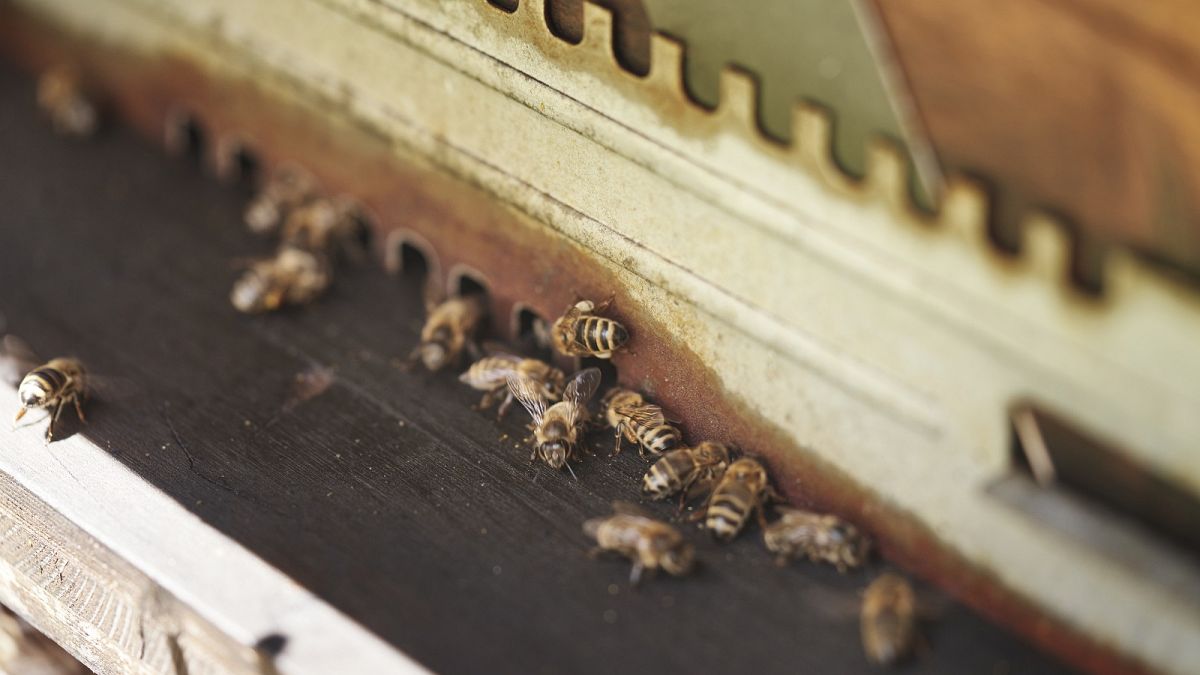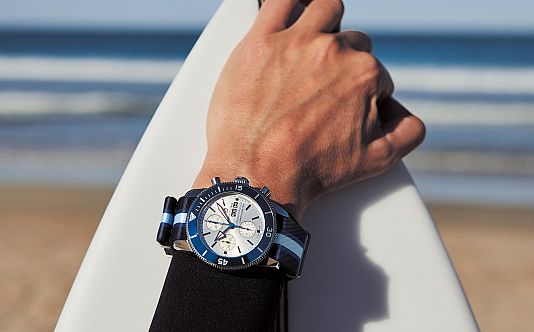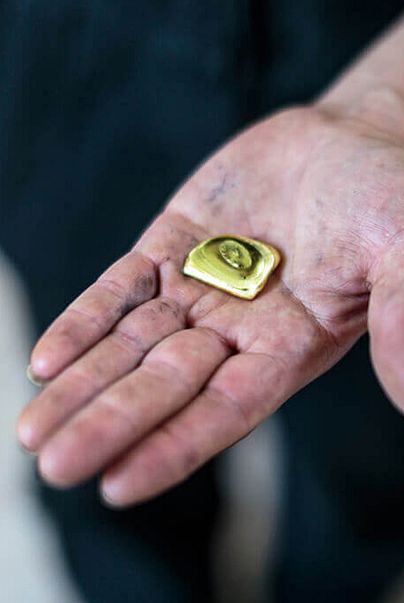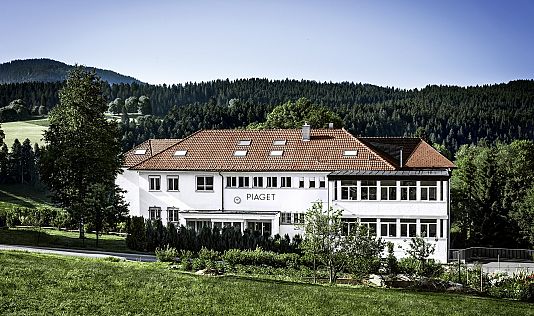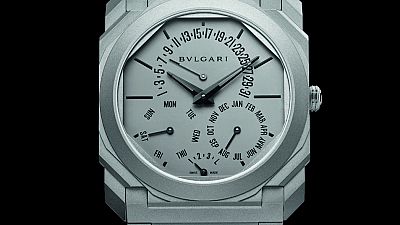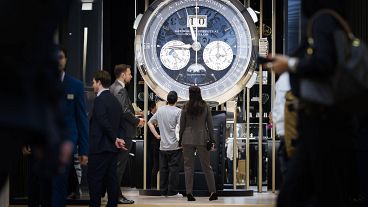Taking responsibility: How watchmakers are embracing sustainability to preserve the planet
As a climate crisis looms, the watchmaking industry is embracing sustainability in a bid to help reduce its carbon footprint and manage diminishing natural resources more responsibly.
There is something inherent in the crafting of timepieces built to last that makes horology and sustainability comfortable bedfellows. In a world where climate activism has gone from strength to strength, sustainability is increasingly becoming a watchword for many consumers who are looking to change their habits and avert a climate disaster.
"I think people, even though we cannot change the world - as a luxury brand we’re too small - people expect us to have sustainable behaviour in everything we’re doing," Georges Kern, CEO of Breitling, told Euronews during the Grand Prix d'Horlogerie de Genève, an annual awards event that recognises the top watchmakers.
Repurposing plastics
Breitling, like a growing number of brands in the industry, is turning more to recyclable materials in its products, including when it comes to packaging the watches it sells. It has, for instance, recently launched a newly-designed watch box made from plastic bottles which will be available from early 2021.
"Of course, we’re not Coca Cola. We cannot stop PET bottles but as you know, we have just launched our upcycled packaging to send a sign," said Kern.
It is certainly a declaration of intent, with the boxes replacing the heavy, cumbersome watch boxes that were once a mainstay of the industry. As well as being made 100 per cent from recycled PET plastic bottles, the boxes themselves are completely recyclable.
Reusing plastic has become something of a cause célèbre for Breitling, throwing its weight behind ocean conservation and the issue of discarded plastics littering the floor of our oceans. It is something the brand has even brought to global attention in its watch designs. The straps for its Superocean Outerknown diver's watch, for example, are made from recycled nylon waste, the biggest source of which is abandoned fishing nets.
Watchmakers are under no illusion that such moves alone will not solve ecological crises facing the planet. Their watches may, however, serve as a waymarker for the bearer.
"It’s more about educating and telling the stories about problems with the environment to 200,000 clients a year who are very influential," according to Kern. "It’s not us directly who can change the world but probably many of these 200,000 clients who have influence and who like luxury products but sustainable luxury".
Diminishing natural resources
While there are some who persistently deny climate change, science has empirically linked human activity to the environmental crises we find ourselves presented with. Besides enabling education and advocacy, there is still a lot that more that can be done on a practical level to ensure that the industry is negating its own impact on the world.
As resources become increasingly scarce, the impetus is on watchmakers in the industry to find sustainable raw materials to create their timepieces. At Girard-Perregaux, it's an ethical obligation that is something taken very seriously.
"I think when you’re a brand that is almost celebrating its 230th anniversary, sustainability is far more than just a goal to achieve, it’s more of our responsibility, meaning that we have to make sure that we are respectful of the environment," explained Clémence Dubois, Girard-Perregaux's chief product and marketing officer.
As an adherent to the Kering Group's 2025 Sustainable Strategy, along with the group's other watchmakers and fashion houses, Girard-Perregaux has committed itself to establishing traceable and environmentally responsible supply chains.
This includes sourcing fairmined gold from Peru used in its watch casings. The practice of fairmining operates in a similar way to fairtrade foodstuffs in that the raw material is procured from responsible, small-scale artisanal mines that have empowered its workers and respect stringent safe working conditions.
"Using more sustainable materials is one thing, but then you have to make sure that the material itself respects the standards of quality you want for the brand, that it is able to pass all the tests that you want to submit your watch to," said Dubois. Evidently, this includes the longevity of materials to match the lifecycles of the movements crafted for each individual timepiece.
"When you’re a company that has so much history, where we are able to pass on something from one generation to another in some way, you have to keep on innovating and make sure you do things the right way," she adds. "For us, it’s important to do the right thing but also to make sure we perpetuate what we do. Watchmaking in general is highly sustainable. The product lifecycle is so long; if you take the movement itself, it is made to last".
One thing not set to last is the Earth's biodiversity given the current trajectory of global warming. Bees in particular, which are vitally important pollinators, are under threat. Urban beekeeping has been shown to help cultivate healthier, hardier bee populations - and so it is in the gardens at the company's headquarters in Le Chaux-de-Fonds.
Staff are encouraged to be involved in the upkeep of the bee colonies, from which up to 15kg of honey is harvested every year. It is a small amount but the hives are not only helping to support the local eco-system, but they also act as a focal point. "It helps remind us every day that we have a role to play," said Dubois.
Reducing carbon footprints
Nestled in the village of La Côte-aux-Fées at the heart of the Neuchâtel Jura region, the location of Maison Piaget's workshop, surrounded by rolling pastures, hills and alpine forests, provides ample inspiration for its craftsmanship. It also acts as motivation.
"It is not surprising that Valentin Piaget, George-Edouard Piaget’s grandson, found inspiration for the organic style of Piaget creations in a place rich in nature, life and colours," Chabi Nouri, CEO of Piaget, told Euronews. "It is because of this enduring bond with nature that Piaget has long made protecting the environment a real priority".
Perhaps given its rural setting, Piaget has been particularly active in reducing its carbon footprint. This has been centred on, but not restricted to, architectural innovations, including the Piaget boutique in Changsha, China which was the company's first to receive a gold Leadership in Energy and Environmental Design (LEED) certification. The company's specially-built Geneva headquarters, too, runs mostly on renewable energy and is designed for low-energy consumption.
In 2019 alone, through measures like reducing air travel for staff and promoting soft mobility through the use of bikes and walking for commuting, the watchmaker was able to reduce its carbon emissions by 9 per cent.
"Sustainability is in the essence of our business, as our jewellery and watches are designed to last for decades and even centuries, being passed on from generation to generation," said Nouri.
"We believe our creations play a special role in people’s lives. They carry personal and emotional significance," she adds. "This is why we are convinced that our customers also value the way our jewellery and watches are made, without causing harm to people or the planet".
